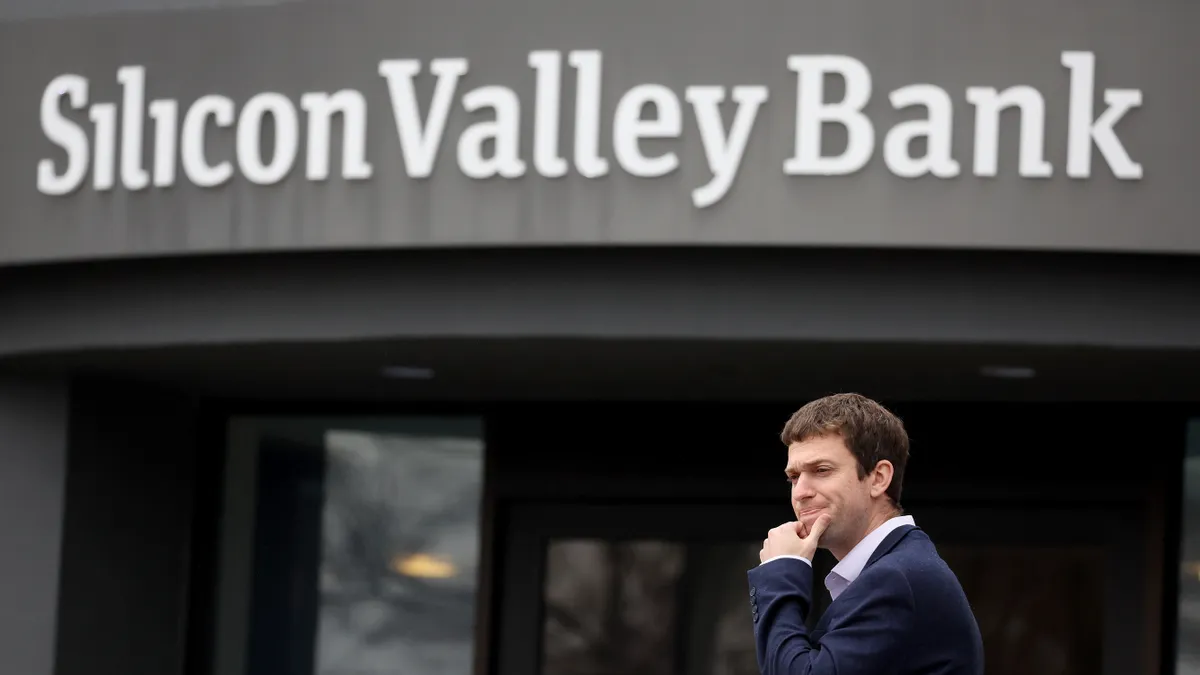SVB Financial Group and top executives failed to disclose to investors how rising interest rates would leave Silicon Valley Bank, the firm’s banking unit, “particularly susceptible to a bank run,” alleges a class-action lawsuit filed Monday.
The suit is seeking unspecified damages for the bank’s investors between June 16, 2021, and March 10.
The Santa Clara, California-based SVB was closed by regulators Friday marking the nation’s largest bank failure since Washington Mutual collapsed in 2008.
The bank, which catered to startups and technology companies, faced a historic bank run last week after news of the firm’s nearly $2 billion loss, related to the sale of U.S. treasuries and mortgage-backed securities, spooked depositors.
Monday’s proposed class action, brought by a group of shareholders led by Chandra Vanipenta, alleges SVB, CEO Greg Becker and CFO Daniel Beck concealed to investors the impact that high interest rates would have on the tech- and VC-focused firm’s business.
“The company failed to disclose to investors that, in an environment with high interest rates, it would be worse off than banks that did not cater to tech startups and venture capital-backed companies,” the lawsuit alleges.
In the filing, the plaintiffs accused Becker and Beck of intending to either "deceive" investors or of acting “with reckless disregard for the truth when they failed to ascertain and disclose the true facts in the statements made by them or other personnel of the company to members of the investing public."
The firm’s actions, under Becker and Beck’s leadership, “artificially inflated” SVB’s stock price, the 17-page lawsuit alleges.
“Had plaintiff and the other members of the class been aware that the market price of the company’s securities had been artificially and falsely inflated by the company’s and the individual defendants’ misleading statements … they would not have purchased the company’s securities at the artificially inflated prices that they did, or at all,” the lawsuit claims.
SVB did not immediately respond to Banking Dive’s request for comment.
The complaint, filed in federal court in San Jose, California, comes in the wake of two bank failures that have rocked the financial services industry.
Days after the collapse of SVB, federal regulators announced the closure of crypto-friendly Signature Bank, a New York City-based firm that experienced a similar bank run in the wake of the SVB fallout.
The failures of SVB and Signature Bank are expected to lead to more claims against the banks’ directors and officers, said Josh Migdal, a partner at Mark Migdal & Hayden.
Auditors, law firms and investment banks tied to the collapsed institutions could also emerge as litigation targets, Migdal said, adding claims against such parties surfaced in the aftermath of the savings-and-loan crisis of the 1980s and the 2008 financial crisis.
However, Midgal added, it’s premature to determine whether such parties had culpability in connection with the failures of SVB and Signature.
Meanwhile, Becker’s actions weeks ahead of SVB’s collapse have drawn scrutiny from a California lawmaker.
SEC filings show the former CEO sold $3.6 million worth of SVB shares on Feb. 27.
Rep. Ro Khanna, D-CA, on Sunday called for a clawback of the funds, telling The Washington Post, “It should be going to the depositors.”
Khanna, emphasized caution, however, adding the sale may not indicate wrongdoing.
“It’s important to understand before casting aspersions on someone’s motives whether it is a scheduled sale … which are done many months before,” he said. “We do need all the facts to come out before jumping to conclusions.”
But, if there is evidence of bad behavior, the government “could sue,” he added.
In a speech Monday, President Joe Biden called for a "full accounting" of what led to the collapse of SVB and Signature.
"No one is above the law," Biden said, adding he plans to ask Congress and banking regulators to strengthen bank regulations in the wake of the two banks' failures.
While SVB and Signature depositors can “rest assured” that their deposits were safe, Biden said investors would not face the same protections.
“They knowingly took a risk, and when the risk didn't pay off, investors lose their money,” he said. “That's how capitalism works.”












